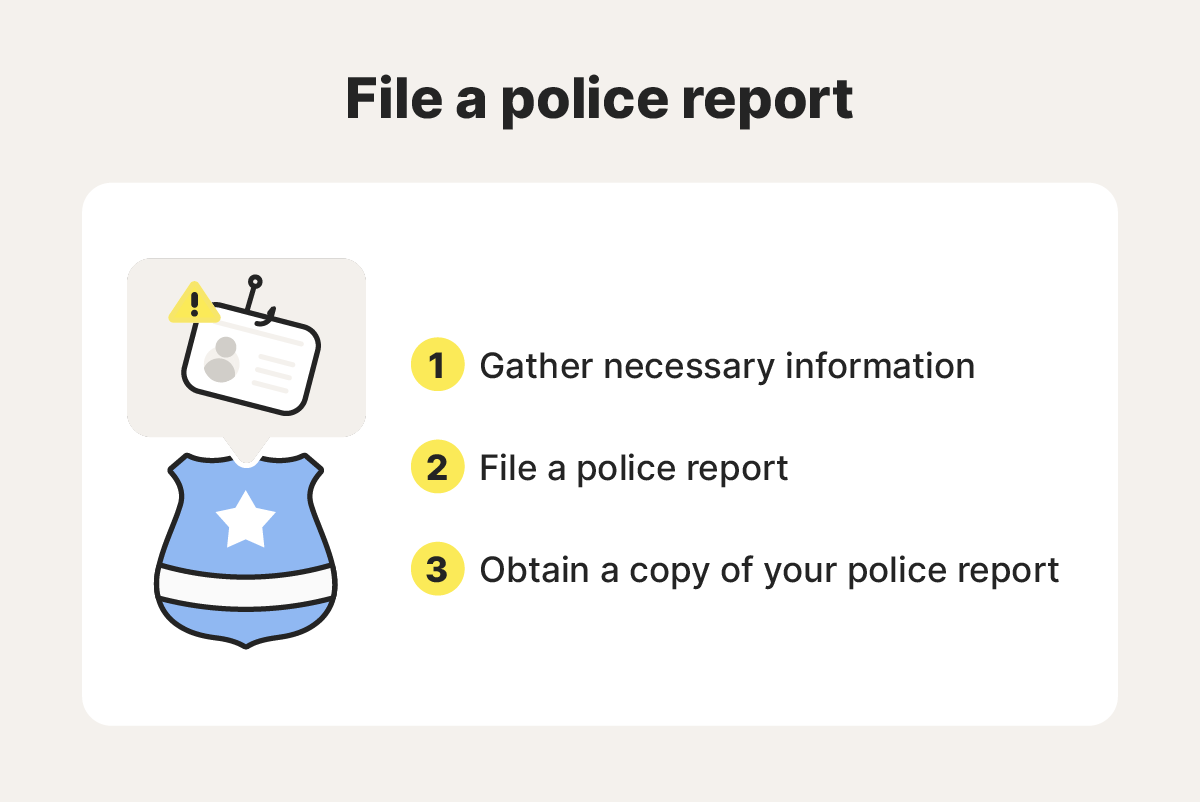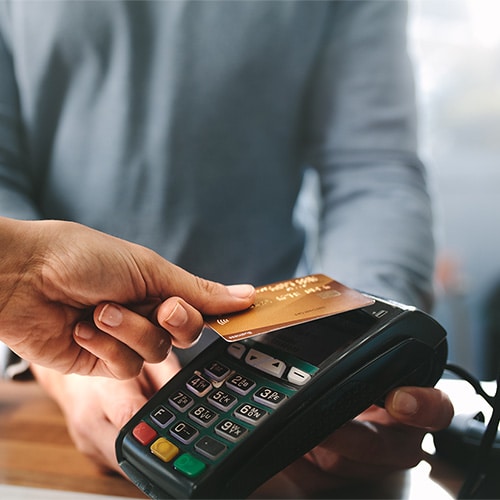To criminals, stolen credit cards can seem like an “infinite free money” hack, which helps explain why credit card fraud is so prevalent. In 2024 alone, there were nearly half a million reports of credit card fraud, making it the most common type of identity theft. If you fall victim to credit card theft or fraud, you’ll likely feel overwhelmed and have a few questions.
Once you’ve canceled your compromised card, you’ll probably wonder whether you should file a police report for credit card theft. Continue reading to learn about who handles credit card theft investigations, when to get the police involved, and how identity theft protection from LifeLock can amplify your protection and help lock down your personal information.
Who handles credit card theft investigations?
Financial institutions, the police, and federal agencies typically handle credit card theft investigations.
- Financial Institutions: When you notice a fraudulent charge on your account or that your card is stolen, you should first contact your bank. They’ll help you protect your account and cancel your compromised card. Then they’ll review your case, look for suspicious patterns in your transaction history, and reimburse you if they confirm theft.
- Police: The police are more likely to investigate credit card theft if it’s tied to wider criminal activity or involves a significant monetary value. They will also intervene if the theft is connected to acts of violence.
- Federal Agencies: Federal agencies typically only investigate significant cases where credit card fraud spans state or international lines, is linked to organized crime, or targets specific populations (e.g., the elderly) on a large scale.
Should you contact the police about credit card theft?
Yes, you should report credit card fraud to the police — even if they won’t investigate — because filing a report is vital for creating an official record that helps support your case if complications arise with your bank or a credit agency.
For example, there may be instances where the issuing bank refuses to reimburse you, or a credit bureau erroneously lowers your credit score after the fraud.
Many times, the only thing that can reverse the bank’s or bureau’s decision is a police report.
Some banks may even request a police report as part of their internal investigation. Filing a report with law enforcement also helps investigators detect larger patterns of criminal activity.
When do police investigate credit card theft?
Police are more likely to investigate credit card theft when the financial loss is significant, the theft is part of another crime, or it’s part of an identity theft or hacking ring.
Here’s when your police report may trigger an active investigation:
- The financial loss is significant: This is because bigger losses may cross the state’s felony threshold, and could indicate the fraud is part of a larger scheme.
- The theft is part of another crime: This could include a home break-in or carjacking. These crimes are violent or invasive, going beyond simple financial fraud.
- The fraud is part of an identity theft or hacking ring: This can affect the bank accounts, tax records, and credit scores of thousands of citizens, and signals a large-scale security issue.
- There’s available evidence in the form of suspects or leads: This could be security footage, point-of-sale records, or transaction IP addresses.
What happens when you report credit card theft?
When your credit card is stolen or your card details fall into the wrong hands, every second can count. Reporting it fast helps stop the thief and trigger a system designed to protect you. Here’s what happens when you report credit card theft.
1. Your credit card is frozen
When you contact your credit card issuer, they’ll cancel your card to prevent further losses. You’ll need to provide details of the fraud to help them start their investigation.
2. The credit card issuer investigates the fraud
Your financial institution’s internal fraud department will review your account. They’ll scan for suspicious patterns and review your spending history. This process may also involve gathering data from national fraud databases or flagging the merchant.
3. You file a police report
Filing a police report is a crucial step in protecting yourself because it creates an official record of the crime. This documentation strengthens your case with banks, and they may even request this before they start investigating.
When filing, include as many details as possible, such as:
- Bank statements.
- Transaction details.
- Timeline of your movements.


4. Police may investigate the fraud
Filing a police report is a critical first step, but it doesn’t always lead to a full investigation. Many times, the credit theft is too low-profile for the police to consider taking further action. Considering there were nearly half a million reports in 2024 alone, that would require a lot of resources.
So, don’t be surprised if the police refer your case back to the bank’s fraud department. Even if your case doesn’t land on a detective’s desk, it’s still important to file a report.
5. The credit issuer makes a decision based on its investigation
If your credit issuer determines there was fraud involved, they’ll refund you part or all of the amount. Under the Fair Credit Billing Act:
- Your maximum liability is $50 if your credit card is used fraudulently.
- If you report the card stolen before it’s used, you have zero liability.
- If the card number (but not the physical card) is stolen, you’re not liable for any charges.
How to protect yourself from credit card theft
You need to keep your physical card safe, be wary of scams, and protect your personal information online to help prevent credit card theft.
Here’s how to help protect yourself from credit card theft:
- Set up fraud alert notifications: Enable fraud alert notifications with financial institutions and review bank statements regularly for unauthorized charges.
- Enable 2-factor authentication (2FA): Use 2FA on all of your financial accounts. This requires a second verification step when logging in, making it harder for a cybercriminal to steal your card details or make fraudulent transactions via your account.
- Choose contactless payments: Tap your card or use your smartphone instead of inserting your card into a reader. This can be more secure and help you avoid credit card skimming devices that allow criminals to clone your card.
- Avoid clicking suspicious links: Email or SMS phishing attacks rely on social engineering tactics to trick you into clicking malicious links to steal sensitive info like your credit card number.
- Be wary of scams: Stay up to date with other scams that could put your credit card details at risk. For example, an unsolicited call from your “card issuer” could be a scammer trying to steal your card number.
- Run a dark web scan: Dark web monitoring services scan the dark web and notify you if sensitive info like your credit card number is found. This lets you take action to secure your card and accounts, possibly before fraud occurs.
- Get identity theft protection: Consider getting identity theft protection from a trusted brand like LifeLock. This also includes credit monitoring, which will notify you if suspected fraud is detected.
Help protect your credit card with LifeLock
Even if you take all the right precautions to secure your credit card and identity, it’s not always enough. Get LifeLock Total to monitor your credit card and bank accounts, helping you spot suspicious transactions early. Plus, with dark web monitoring and other identity theft protection features baked in, you can help protect your wealth and future with total confidence.
FAQs
What should you do if your credit card issuer won’t refund fraudulent charges?
If the bank won’t refund your money after a fraudulent charge is made, you can file a complaint with the Consumer Financial Protection Bureau (CFPB).
Is credit card fraud a felony?
It can be classified as a felony or a misdemeanor. This usually depends on the amount stolen, whether identity theft or hacking was involved, whether it was part of organized crime, or if the fraud crossed state or national borders.
Can credit card theft be traced?
Physical credit card theft and fraud can sometimes be traced using surveillance footage. Online credit card fraud can sometimes be tracked to its origin, identifiable by the IP address, device details, and geolocation data.
How can I improve the chances of the police investigating my credit card theft?
File a detailed police report detailing the financial loss involved, timelines for when the fraud occurred, bank statements, and anything else that could help the police.
Do police investigate credit card theft under $500?
Police don’t have infinite resources, so they can’t investigate every case of credit card theft. However, they’re more likely to investigate if a wider crime syndicate is implicated, if violence was involved, if there’s solid evidence, or if it crosses the relevant state’s felony threshold.
Editor’s note: Our articles provide educational information. LifeLock offerings may not cover or protect against every type of crime, fraud, or threat we write about.
This article contains
Start your protection,
enroll in minutes.
LifeLock is part of Gen – a global company with a family of trusted brands.
Copyright © 2026 Gen Digital Inc. All rights reserved. Gen trademarks or registered trademarks are property of Gen Digital Inc. or its affiliates. Firefox is a trademark of Mozilla Foundation. Android, Google Chrome, Google Play and the Google Play logo are trademarks of Google, LLC. Mac, iPhone, iPad, Apple and the Apple logo are trademarks of Apple Inc., registered in the U.S. and other countries. App Store is a service mark of Apple Inc. Alexa and all related logos are trademarks of Amazon.com, Inc. or its affiliates. Microsoft and the Window logo are trademarks of Microsoft Corporation in the U.S. and other countries. The Android robot is reproduced or modified from work created and shared by Google and used according to terms described in the Creative Commons 3.0 Attribution License. Other names may be trademarks of their respective owners.







